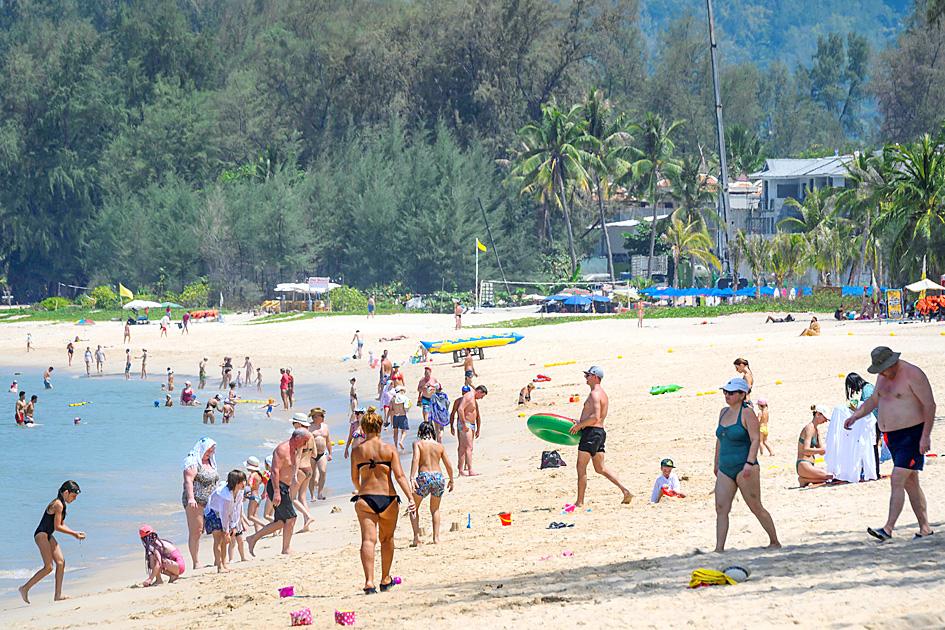Thousands of Russian tourists are stranded in Thailand’s beach resorts because of the war in Ukraine, many unable to pay their bills or return home because of sanctions and canceled flights.
The crisis in Europe also put a crimp in recovery plans for the Southeast Asian nation’s tourism industry, which has hosted more visitors from Russia than any of its neighbors before the COVID-19 pandemic hit.
There are about 6,500 Russian tourists stuck in Phuket, Surat Thani, Krabi and Pattaya, four provinces that are popular seaside resort destinations, in addition to 1,000 Ukrainians, Yuthasak Supasorn, governor of the Tourism Authority of Thailand, told reporters on Friday.

Photo: AFP
About 17,599 Russians accounted for the largest bloc of arrivals last month, representing 8.6 percent of a total of 203,970, according to the Thai Ministry of Public Health.
After the Feb. 24 Russian invasion of Ukraine, their numbers drastically declined.
Yuthasak said the Russians face two main problems: Cancelations of their flights home by airlines that have stopped flying to Russia and suspension of financial services, particularly by credit card companies that have joined sanctions against Moscow. There are also some who prefer to delay their return.
“There are some airlines that still fly to Russia, but travelers have to transit in another country. We are trying to coordinate and search the flights for them,” Yuthasak said.
While almost all direct flights from Russia have been suspended, connections are still available through major carriers based in the Middle East.
He said efforts are also being made to find alternative methods of payments for Russian tourists.
Siwaporn Boonruang, a volunteer translator for Russians stranded in Krabi, said some cannot pay their bills because they can no longer use Visa or Mastercard credit cards.
Many have cash and those with UnionPay credit cards, which are issued by a Chinese financial services company, can still use them, but payment by cryptocurrency is not allowed, she said.
Many hotels have helped by offering discounted rates, she added.
Thailand’s government has offered 30-day visa extensions without payment, and is trying to find low-cost alternative accommodation for people forced to stay for an extended period.
The problems associated with the war in Ukraine have compounded Thailand’s hopes for economic recovery. Officials hope to see the threat from the pandemic ebbing by July, even though daily cases are at record highs, driven by the Omicron variant of SARS-CoV-2.
Thai authorities later this year expect to drop most quarantine and testing regulations that have been in place to fight the spread of the virus, which would make entry easier for foreign travelers.
Thailand might have to lower its targets for tourist arrivals and revenues this year because of the knock-on effects of rising oil prices and inflation on global travel, Yuthasak was quoted saying by the Bangkok Post newspaper.
“Tourism is still a key engine to revive our economy, even though revenue was stymied by negative factors,” he said.
According to the report, Thailand had projected gaining a total of 1.28 trillion baht (US$38.4 billion) in revenue this year from foreign and domestic tourists.

A fire caused by a burst gas pipe yesterday spread to several homes and sent a fireball soaring into the sky outside Malaysia’s largest city, injuring more than 100 people. The towering inferno near a gas station in Putra Heights outside Kuala Lumpur was visible for kilometers and lasted for several hours. It happened during a public holiday as Muslims, who are the majority in Malaysia, celebrate the second day of Eid al-Fitr. National oil company Petronas said the fire started at one of its gas pipelines at 8:10am and the affected pipeline was later isolated. Disaster management officials said shutting the

US Vice President J.D. Vance on Friday accused Denmark of not having done enough to protect Greenland, when he visited the strategically placed and resource-rich Danish territory coveted by US President Donald Trump. Vance made his comment during a trip to the Pituffik Space Base in northwestern Greenland, a visit viewed by Copenhagen and Nuuk as a provocation. “Our message to Denmark is very simple: You have not done a good job by the people of Greenland,” Vance told a news conference. “You have under-invested in the people of Greenland, and you have under-invested in the security architecture of this

Japan unveiled a plan on Thursday to evacuate around 120,000 residents and tourists from its southern islets near Taiwan within six days in the event of an “emergency”. The plan was put together as “the security situation surrounding our nation grows severe” and with an “emergency” in mind, the government’s crisis management office said. Exactly what that emergency might be was left unspecified in the plan but it envisages the evacuation of around 120,000 people in five Japanese islets close to Taiwan. China claims Taiwan as part of its territory and has stepped up military pressure in recent years, including

UNREST: The authorities in Turkey arrested 13 Turkish journalists in five days, deported a BBC correspondent and on Thursday arrested a reporter from Sweden Waving flags and chanting slogans, many hundreds of thousands of anti-government demonstrators on Saturday rallied in Istanbul, Turkey, in defence of democracy after the arrest of Istanbul Mayor Ekrem Imamoglu which sparked Turkey’s worst street unrest in more than a decade. Under a cloudless blue sky, vast crowds gathered in Maltepe on the Asian side of Turkey’s biggest city on the eve of the Eid al-Fitr celebration which started yesterday, marking the end of Ramadan. Ozgur Ozel, chairman of the main opposition Republican People’s Party (CHP), which organized the rally, said there were 2.2 million people in the crowd, but